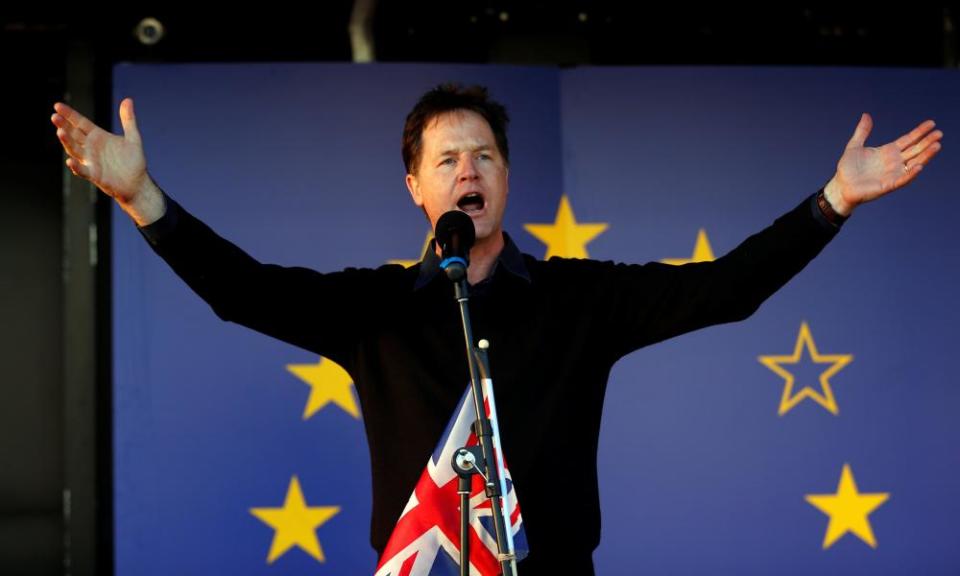Nick Clegg’s second act is a tragic loss of face

A few years ago, the founder of a firm I worked for became heavily involved with Gordon Brown’s education initiative. It was an unpublicised and discreet operation. Most of the employees only found out as a result of gossip about sightings of the ex-PM on the premises. Coming back from lunch one day I spotted a small, slightly battered car waiting outside the office, with a familiar face in the back. Brown was squeezed between two other people, his usual resting sombre face staring blankly ahead. He had such little room that he had to hug his briefcase to his chest, giving him an air of vulnerability, almost of fright. It looked like he was being kidnapped in a minicab.
Ye shall know them by their post-politics careers: while Gordon Brown focused his energy on supporting primary education around the world, a perma-tanned Tony Blair amassed a staggering private fortune, joining a global elite of private corporations and dodgy political regimes. His predecessor, John Major, joined the lucrative speaking circuit and took up an advisory position for Credit Suisse. New to this set is one Nick Clegg, less a politician and more of a living Faustian tragedy. After crashing out in the big Liberal Democrat electoral meltdown of 2017, he has announced that he will be joining Facebook as head of global affairs.
The optics are bad. Clegg was a passionate and high-profile pro-remain and People’s Vote campaigner. The news that he is moving to California came a day before the anti-Brexit march on Saturday. His explanation for his decision, published in the Guardian, reads like a sheepish but also chippy apology. He says he has “mixed feelings about leaving the UK’s public debate about the future of our country’s relations with the rest of Europe”, but that “the Brexit drama will soon move to the place where it arguably belonged all along, in parliament”. He isn’t an MP and fighting Brexit is important, but it’s not a career, goddamit. Nick Clegg is, quite simply, fleeing the scene. Accusations of a blase elite bailing out whenever things get too choppy seem unavoidable.
During Barack Obama’s first presidential election campaign, a BBC journalist visited a traditionally Republican southern state, interviewing its white voters about Obama’s prospects. “Do you think being black harms his chances here?” he asked one man having a drink at a bar. “Well,” the man replied, “it doesn’t help!” Clegg’s move might not harm the anti-Brexit campaign, but it sure doesn’t help. It already has to contend with complaints of elitist metropolitanism from authentocrats who will not rest until every last remainer is a dust-smeared chimney sweep. A defence Clegg could have done without came in the shape of Chuka Umunna insisting that Clegg is “a private citizen” and can do whatever he wants. Umunna’s endorsement was part of an LBC interview on Saturday morning in which he had to answer questions about his own lucrative new role, a side gig as chair of a centrist thinktank that is paying him £65,000 a year for 12 hours of work a month.
All this does not sit well, for the same reason Bill and Hillary Clinton’s years of hectic money-making stick in the craw: the sense that their politics is about brand, rather than values. To spend your tenure campaigning for social justice and equality only to leverage that for personal enrichment is exploitative of those who voted for you, and raises questions about sincerity. It makes your time in politics seem like an extended interview and networking opportunity. Already Clegg must have either tempered or jettisoned his objections to tax avoidance. On an income of £1.3bn, Facebook’s latest UK tax bill was £15.8m.
It is true, Clegg is a private citizen who can make money how he pleases. Umunna can be “fed up” with the “liberal metropolitan elite smear” and still get paid £450 an hour if it suits him. But the nature of a politician’s extra- and post-curricular activities is a tell, an insight into the extent to which they are motivated by career as opposed to cause. Public service is not a pit stop. Despite Clegg’s new belief in the power of Facebook to “build bridges” (for £1m a year before stock options and bonuses), and his forlorn “mixed feelings” about checking out, work for the common good can continue long after one has left parliament. Indeed, it is especially urgent a calling right now: Brexit demands every resource be marshalled. But then Clegg’s decamping is a good reminder of what landed us with Brexit in the first place – the recklessness of politicians for whom the stakes are very different. Thanks for nothing, Nick. The people will take it from here.
• Nesrine Malik is a Guardian columnist

 Yahoo News
Yahoo News 